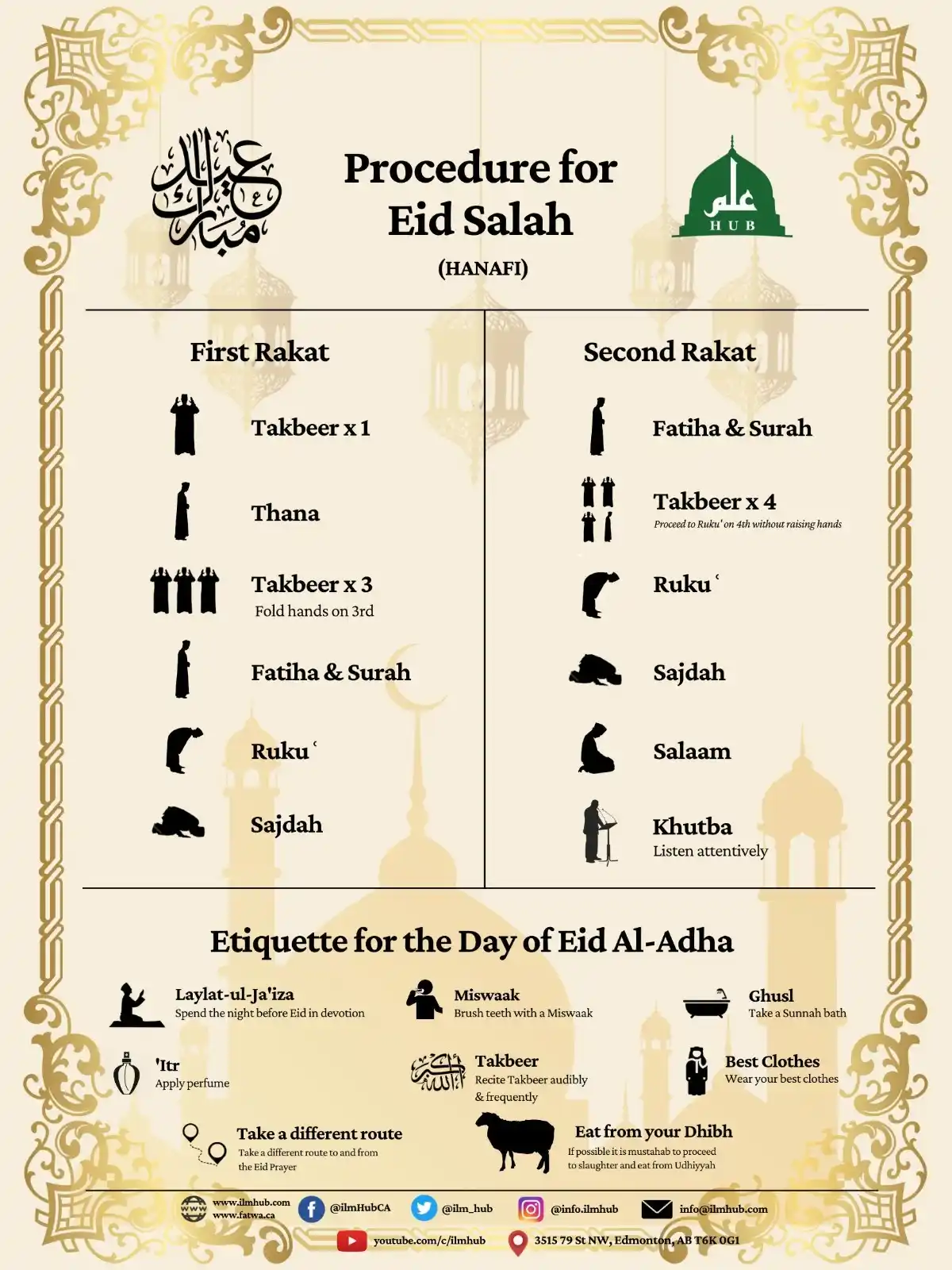
IlmHub Official
186 subscribers
About IlmHub Official
The official channel of the ilmHub on WhatsApp. ilmHub is a Religious Organization based in Edmonton, Canada. It oversee and consolidate different projects under the guidance of Mufti Faisal al-Mahmudi.
Similar Channels
Swipe to see more
Posts

*===================* *New Blog Post Added* *with Mufti Faisal al-Mahmudi* *===================* *Title:* Reassessing the Principle of Default Permissibility in Contemporary Consumer Markets We observe that AskHalal frequently conducts extensive reviews of products and often classifies them as doubtful (mashbūh). Below, we present an excerpt from Mufti Taqi Usmani in which he discusses the principles of ḥalāl and ḥarām, emphasizing the default position of permissibility for all non-meat items. He also notes that excessive scrutiny is not in accordance with the Prophetic approach in Islam. We request your feedback on his remarks and their relevance to current practices. *Sharing Link:* https://ilmhub.com/reassessing-the-principle-of-default-permissibility-in-contemporary-consumer-markets/


*Topic: Description of Hell* *Venue:* Masjid al-Falah *Speaker:* Mufti Faisal al-Mahmudi Ramadhan 1446 *Duration:* 1 hr 30min https://ilmhub.mixlr.com/recordings/2793265


======================= *Islamic Questions & Answers* Darul Iftaa Canada with Mufti Faisal al-Mahmudi (fatwa.ca) ======================= *Sharing Link:* https://qna.ilmhub.com/question/woman-who-does-not-sit-in-iddah-will-she-be-an-offender/ *Question:* If a woman does not sit in iddah after the death of her husband. Will she be an offender? *Answer:* *Bismillahi Ta'ala* *Walaikum Assalam Warahmatullah,* Iddah is a wajib imposition established from Qur'an, and thus it is in the rank of fardh ruling. Violation or breaking it is same is being disobedient with a fardh ruling of Allah. > Allah Ta'ala says, "Those among you who pass away and leave wives behind, *their wives keep themselves waiting for four months and ten days*. So, when they have reached (the end of) their waiting period, there is no sin on you in what they do for themselves in recognized manner. Allah is All-Aware of what you do." (Qur'an 2:234) *Wallahu A'lam* *And Allah Ta’āla Knows Best* *Mufti Faisal al-Mahmudi*

======================= *Islamic Questions & Answers* Darul Iftaa Canada with Mufti Faisal al-Mahmudi (fatwa.ca) ======================= *Sharing Link:* https://qna.ilmhub.com/question/can-we-do-wudhu-while-wearing-invisalign/ *Question:* Can we do wudhu while wearing invisalign? *Answer:* *Bismillahi Ta'ala* *Walaikum Assalam Warahmatullah,* Washing of inner part of the mouth through maḍmaḍah (motion of rinsing the mouth) is sunnah of a Wudhu'. ʿAllāmah Shurunbulālī rh. mentions in Imdād al-Fattāḥ Sharḥ Nūr al-Īḍāḥ, > "It is not obligatory to cause water to reach the concealed part of the lips when they are closed in their usual manner, because what is enclosed is considered part of the mouth, according to the most correct opinion, and what is visible is considered part of the face." (Pg. 71) Regarding your question, while their website suggests that it is not designed to formulate a water tight seal, Invisalign may prevent water from coming in contact parts of the teeth. This does *not* affect the validity of wudhu'. Although one would not be able to do their maḍmaḍah properly with them on, and thus loose out on rewards of Sunnah. We suggest to remove them before making maḍmaḍah. *Wallahu A'lam* *And Allah Ta’āla Knows Best* *Mufti Faisal al-Mahmudi*

======================= *Islamic Questions & Answers* Darul Iftaa Canada with Mufti Faisal al-Mahmudi (fatwa.ca) ======================= *Sharing Link:* https://qna.ilmhub.com/question/how-many-udhiyah-per-family-needed-can-i-donate-all-meat/ *Question:* I had a question regarding qurbani/udhiyah, If there are 3 families within a household are they to do 3 each (let’s assume goat/sheep) or 1? They share same "fireplace"/cooking area (mentioning this as I’ve heard that 1 qurbani/udhiyah for the household due to the affordability/necessity and the condition is if they share 1 “fireplace”/cooking area) The norm used to be to add a portion for a cow but that may not be the case this year. Also, can I offer a sacrifice for me and my family abroad to a place in need and donate it all entirely without eating anything from it? Looking forward to a response. *Answer:* *Bismillahi Ta'ala* *Walaikum Assalam Warahmatullah,* According to the Hanafi jurists, it is wajib upon every mature, sane individual who possesses nisab (the minimum zakatable threshold) and is not a traveller, to offer one sheep or one-seventh share in a cow or camel for udhiyah. In simple terms, the Hanafi school holds that the obligation of udhiyah is individual. While multiple individuals may share in large animals such as cows or camels, a single sheep cannot suffice for more than one person’s wajib obligation. Therefore, within a household, each person who meets the qualifying criteria bears an independent duty to perform udhiyah. A collective udhiyah will not discharge the obligation on behalf of the entire family. As for your second question, then Yes, you may choose to have the slaughter done at another location based on affordability or need-base. It is not a condition of udhiyah that the slaughterer must eat from it. If you require detail answer why hanafi ruling adopts this position, I am attaching herewith an answer from my teacher. And Allah Ta’ala Knows Best Mufti Faisal al-Mahmudi ======================================== Question: _Recently on social media people were saying that there is no need to slaughter more than one sheep or goat per household._ _They quoted the following Hadiths to substantiate this:_ _1. Narrated by 'Aaishah (radiyallahu 'anha) and Abu Hurayrah (radiyallahu 'anhu) that when Rasulullah (sallallahu 'alayhi wasallam) wanted to do Qurbani then He (sallallahu 'alayhi wasallam) took two healthy sheep and cut one on behalf of the Ummah and other on behalf of Himself and his Family._ _2. Narrated by ‘Ata ibn Yasar (rahimahullah) a Tabi'i asked Abu Ayub Ansari (radiyallahu 'anhu) a Sahabi that how did you do sacrifice (udhiyah) during the time of Rasulullah (sallallahu 'alayhi wasallam)? Upon which the Sahabi said during the time of Rasulullah (sallallahu 'alayhi wasallam) a person gave one goat for sacrifice (udhiyah) on behalf of himself and his household (family). They used to eat from it and distribute from it. After that people started doing pride and the situation changed as it is now._ _Is the deduction correct?_ Answer According to the Hanafi ‘Ulama, this deduction is incorrect. Basically, if there is only one person in a house on whom the udhiyah/qurbani is binding, then one sheep will suffice. The Hanafi Jurists have ruled that it is binding (wajib) on every mature, sane person who has the nisab (zakatable amount) and is not on journey, to slaughter one sheep or one of seven parts in a cattle or camel. (Tanwirul Absar; see: Raddul Muhtar, vol.6 pg.313-15) Simply speaking, according to the Hanafi school, the obligation is separate on each individual. They may only share in the big animals; like cows and camels. One sheep will not absolve more than one person of their obligatory (wajib) sacrifice. Proofs for 'individual obligation There are several authentic narrations in which Nabi (sallallahu 'alayhi wasallam) issue an explicit command to an individual to slaughter a goat or sheep. 1. Sayyiduna Jundub (radiyallahu ‘anhu) reports that Nabi (salallahu 'alayhi wasallam) said: 'Whoever slaughtered before the salah, should slaughter another in place of that one. Whoever hasn’t yet slaughtered should now slaughter [after the salah] while taking Allah’s name.' (Sahih Bukhari, Hadith: 985. Also see: Sahih Bukhari, Hadith: 968 & 984) In none of these narrations did he (sallallahu'alayhi wasallam) ever say: 'do it [slaughter one sheep/goat only] and the obligation will fall of all your family members.' Neither did he (sallallahu 'alayhi wasallam) say: 'Whichever household has already slaughtered, should repeat, or that household which has not yet slaughtered should do so now [after the salah].' Rather his address was to each [eligible] individual. Hence, it is clearly understood that as far as the obligation is concerned, it is directed separately to each eligible individual. The following narration evidently supports this: 2. Rasulullah (sallallahu ‘alayhi wasallam) said: 'Whoever can afford to slaughter in this day but fails do so should not even come to our Eid salah.' (Sunan Ibn Majah, Hadith: 3123, Mustadrak Hakim, vol.2 pg.389. Also see I'laus Sunan, vol.17 pg.212-217. Although some experts deem this more correctly attributed to the Sahabi, in this case that does not make much of a difference as explained by Moulana Zafar Ahmad in I'laus Sunan) 3. In a Hadith of Sahih Bukhari, a Sahabi (radiyallahu'anhu) who had slaughtered before the Eid salah offered the following excuse: 'I knew that today was a day of slaughter, and I wished that my animal be the first to be slaughtered in my house.' This shows that there were others in the house who were going to slaughter as well. Therefore Rasulullah (sallallahu 'alayhi wasallam) replied: 'Your sheep/goat it not counted as the obligatory one….' The Sahabi was then instructed to slaughter another animal after the Eid salah. (Sahih Bukhari, Hadith: 955, 968 and 976) If this animal was on behalf of the obligation of the entire household, Nabi (sallallahu 'alayhi wasallam) would've said: 'The sheep/goat of your household is not counted as the obligatory one…' Thus it is clear that in that home, there were others who were going to slaughter separately. Moreover, in this particular case, Rasulullah (sallallahu 'alayhi wasallam) would've told this Sahabi, that although his slaughter was invalid, he need not to repeat it since there are others in his house who were going to slaughter anyway, and that would absolve him too. This was not the case. He was instructed to repeat his slaughter, since it was obligatory on each individual separately. Therefore according to the Hanafi School, in light of the above, one sheep cannot suffice for more than one individual as far as the wajib obligation is concerned. *Explanation of the Hadiths in the question* 1. Therefore, the Hadiths in question should be understood as referring to 'non obligatory' slaughter. In none of the narrations does it state that the sacrifice that Nabi (sallallahu'alayhi wasallam) offered on behalf of others was the binding sacrifice. Rather, these are understood to be the optional sacrifice. Just as the slaughter of Nabi (sallallahu'alayhi wasallam) on behalf of his entire Ummah [as in the first Hadith in question] is not considered as sufficient for their obligatory slaughter. It is merely a dedication of the reward for them. Similarly, any other Hadith that mentions slaughtering only one sheep or goat on behalf of more than one individual will also be viewed in this light. i.e, it was not their obligatory sacrifice. (Sharh Mukhtasar Tahawi of Jassas, vol.7 pg.327 & Badi'us Sanai', vol.5 pg.70) 2. As far as the second Hadith in your question is concerned, Imam Muhammad ibn Hasan (rahimahullah), a direct student of Imam Abu Hanifah (rahimahullah) and the third most senior scholar in the Hanafi Madhab explains: [This applies when] 'A man who is in need [i.e, one on whom it is not binding] slaughters an animal to feed himself and his family.' He says further: 'This will not suffice for more than one in terms of the obligatory slaughter. In that case, one sheep/goat will only absolve one individual. This is the view of Imam Abu Hanifah and all our Scholars.' (Muwatta Imam Muhammad, vol.2 pg.624) The above two interpretations apply to all such narrations which outwardly state that one sheep was slaughtered for an entire household. 3. If per chance these narrations were referring to the mandatory slaughter, then it applies to the 'man of the house' having being the only one on whom it was obligatory. (Hidayah, vol.4 pg.445) Therefore, only one per house was a common practice. This is in keeping with the general condition of poverty among the sahabah (radiyallahu'anhum). (Al-Kawkabud Durri, vol.4 pg.365) *A logical question* Ask yourself: If an animal as big as a cow or camel can only suffice for the obligation of seven people, how can a small sheep or goat suffice for the obligation of an entire family. Irrespective of their number? Note: this logical objection is levelled towards the misunderstanding of the opposing view, and not levelled against the Hadith, Allah forbid. The same applies to the other rational arguments in this document. There is indeed a clear difference between objecting on a Hadith, and objecting on someone's personal understanding on the Hadith. The latter is widely practiced among the scholars. See Sharh Ma'anil Athar, vol.1 pg.395 & Adabul ikhtilaf, pg.124 I have written a detailed article on this issue as well. See it at [http://www.al-miftah.com/why-is-the-udhiyahqurbani-of-one-sheep-not-sufficient-for-the-obligation-of-an-entire-family/]. *And Allah Ta’āla Knows Best* _Answered by:_ *Moulana Muhammad Abasoomar* _Checked by:_ *Moulana Haroon Abasoomar*

======================= *Islamic Questions & Answers* Darul Iftaa Canada with Mufti Faisal al-Mahmudi (fatwa.ca) ======================= *Sharing Link:* https://qna.ilmhub.com/question/if-eid-falls-on-friday-would-its-salah-suffice-for-jumah-salah/ *Question:* If the Eid falls on Friday, would its Salah suffice for Jum'ah Salah as well? What are the opinions as we keep hearing that the correct position is to not pray Friday on such a day. *Answer:* *Bismillahi Ta'ala* *Walaikum Assalam Warahmatullah,* It is Hanafi position that the Eid Congregational Salah and Jum'ah congregational salah are two separate injunctions and one does not waive of the other. Hence one would perform Eid Salah as well as the Friday Salah should they coincide on the same day. The question was answered in detail from Darul Iftaa under Mufti Ebrahim Desai rahimahullah which I am reproducing hereunder: ====== > According to the Ḥanafi, Shafi'i, and Maliki madhhab, if 'Id falls on a Friday, then the 'Id salah and khutbah will not suffice for Jum'ah. The jurists have ruled that these are two different commandments and cannot be combined under any circumstance. (I'laʾ al-Sunan, vol. 8, p. 92) According to the Hanbali madhhab, we have managed to trace a view of Imam Ahmad ibn Hanbal (rahimahu Allah) who says that the 'Id salah will suffice for the Jum'ah, hence, after the 'Id salah, the next salah that a person will have to perform is the 'Asr salah on that Friday. (Tahtawi, p. 288). The ahadith that were mentioned by the Imam are the very same ones which the Hanbalis use to support their madhhab. Before answering these ahadith, we need to understand a few things which are of vital importance. There are four authentic sources in Din from which any masʾalah (ruling) must be established. These are Qur'an, hadith, ijma' (consensus), and qiyas (analogy). As long as a masʾalah is established by any one of these four sources, it will be considered to be part of our Din. It is not necessary for a masʾalah to be established only by Qur'an and/or hadith. The Qur'an and hadith mention guidelines and fundamental laws from which the expert jurists extract and derive various masa'il. It is not the work of any ordinary person to 'glance' at verses of the Qur'an or hadith and then draw up his own conclusions. This is the work of the experts. The four great Imams had sound knowledge of every branch of Din which made them qualify to extract different masa'il after deep study and research into the Qur'an and hadith. It is, therefore, wajib (obligatory) for us to follow them in understanding our Din. Similarly, a person is not allowed to follow his own desires by sometimes following one Imam and at times another. It is wajib to follow one Imam in all his verdicts. Now that we have understood the above, our subject matter is: 'Will 'Id salah suffice for Jum'ah?' We must understand that the obligation of Jum'ah is explicitly mentioned and established by the Qur'an, the strongest of all proofs is the Qur'an. One who denies any verse of the Qur'an will become a kafir. On the other hand, the obligation of 'Id salah is established through hadith. Undoubtedly, the hadith is a very strong proof, but of a lower degree than the Qur'an. One who denies something that is established through hadith will not become a kafir. Keeping this in mind, even a person of little understanding will be able to come to this simple conclusion: how can something that is proven from hadith have so much power and strength that it totally cancels something that is clearly and explicitly proven from the Qur'an? How can the 'Id salah abrogate the obligation of Jum'ah? Furthermore, there are a few ahadith (as mentioned by the Imam) which outwardly show the permissibility of missing Jum'ah when 'Id falls on a Friday. These ahadith have slight variations but the gist of all is similar. As an example, to understand this mas'alah properly, we will look at one narration: Sayyiduna Abu Hurayrah (radiyallahu 'anhu) reports that (on Friday, the day of 'Id), Nabi (sallallahu 'alayhi wa sallam) addressed all his companions saying, "Today, two 'Ids have gathered together ('Id and Jum'ah). Whosoever from you wishes, then this salah ('Id) will suffice him for Jum'ah. We will soon gather again if Allah wills." (Ibn Majah, p. 93) Firstly, the muhaddithin who are the experts in the field of hadith have mentioned that the authenticity of these narrations is disputed. However, even if we have to accept the authenticity of these narrations, then another answer is that during the time of Nabi (sallallahu 'alayhi wa sallam), people from outside the city of Madinah living in the farmlands and villages used to come to Madinah and gather for the 'Id salah. At this point, we have to remember that just as 'Id salah is not wajib on those living outside the city (on farms, villages, etc.), similarly, Jum'ah is also not wajib on them. (Tahtawi, p. 288) These Bedouins and villagers who came to Madinah came on their own will out of joy and happiness, being the day of 'Id. The 'Id salah, as we know, is performed a little after sunrise in the morning. It was, therefore, difficult for these villagers to stay behind in the city after performing the 'Id salah and wait for Jum'ah. This is what is being referred to in these narrations. Looking at all these narrations, with slight variations, one narration says that Nabi (sallallahu 'alayhi wa sallam) said, "Whomsoever wishes he may perform Jum'ah salah and whosoever wishes he may return." Nabi (sallallahu 'alayhi wa sallam) was addressing the Bedouins and villagers here because, for them to stay behind till Jum'ah was a long wait and would be difficult for them. Since Jum'ah was not wajib on them, Nabi (sallallahu 'alayhi wa sallam) said to them that if they wished to return to their farmlands, they are at will to do so. The proof that this law was said only for the Bedouins is that in the first narration of Abu Hurayrah (radiyallahu 'anhu), Nabi (sallallahu 'alayhi wa sallam) said, "We will soon gather again if Allah wills," i.e., here Nabi (sallallahu 'alayhi wa sallam) addressing the people of the city says to them that very soon we will be gathering for Jum'ah. Therefore, the standard answer to all these narrations is that Nabi (sallallahu 'alayhi wa sallam) did give permission to miss Jum'ah if 'Id falls on a Friday, but this permission was only for the Bedouins because Jum'ah was not wajib on them at all in the first place. In order to substantiate this even further, we will look at another narration. Sayyiduna 'Uthman (radiyallahu 'anhu) in his time, once addressed the congregation after the 'Id salah which also fell on a Friday. He said to them, "Whomsoever from amongst the villagers wishes to wait for Jum'ah, then he may do so, and whomsoever wishes to return, then I have granted him permission." (Muwatta', p. 165) Look at this narration. It is clearer than broad daylight that this permission was only for the villagers. Furthermore, in this narration, Sayyiduna 'Uthman (radiyallahu 'anhu) made this statement in front of a large gathering of great sahabah (radiyallahu 'anhum). If this permission was general and included the people of the city also, then the sahabah would have opposed and raised objections immediately against Sayyiduna 'Uthman (radiyallahu 'anhu) as to why he was granting special permission only for the Bedouins and not for the people of the city. In view of the above, and in brief, we will say that if we do accept these narrations to be authentic, then too the permission to skip Jum'ah and suffice on 'Id salah was only for the villagers simply because Jum'ah was not wajib upon them. The second question was with regards to women in their menstrual period coming to the 'Id salah. During the time of Nabi (sallallahu 'alayhi wa sallam), women used to go to the masajid and also be present for the 'Id salah. There are narrations where Nabi (sallallahu 'alayhi wa sallam) permitted the women to attend the 'Id salah. What we need to understand is the reason behind this permission. Why was such permission granted? During that time, Islam and the Muslims were small in number compared to the non-believers. When the Muslims came out to perform the 'Id salah, the women would also join them so as to make the Muslims larger in number and stronger, thereby putting fear into the hearts of the enemy. But in times later on, when Islam grew and the numbers increased, then automatically there was no need for this. Moreover, in today’s times when the level of vice and evil is beyond control, there stands all the more reason for women not to attend the 'Id salah. The Qur'an also mentions that women should stay indoors. For women to attend the 'Id salah is mustahabb in light of the permission granted by Nabi (sallallahu 'alayhi wa sallam), but because of the fear of fitnah and considering the evils and corruption, especially in our times, the fuqaha' have ruled that it is not permissible. Let alone our times today, after the demise of Rasulullah (sallallahu 'alayhi wa sallam), during the time of the sahabah (radiyallahu 'anhum), some of them were also of the same view. That is why Sayyidatuna 'A'ishah (radiyallahu 'anha) is reported to have said, "Had the Prophet (sallallahu 'alayhi wa sallam) been alive in these days, he would have certainly prohibited the women from attending congregational salah." Sayyidatuna 'A'ishah (radiyallahu 'anha) made this statement with regards to her time — the time of the sahabah (radiyallahu 'anhum) — the time when the level of Islam was at its peak. In today's day and age of evil and corruption, it shows us that there is all the more reason for women to be prohibited from leaving the home for any form of congregational salah. And Allah Ta'ala Knows Best Mufti Asad Haffejee Dar al-Ifta' Checked and Approved Correct: Mufti Ebrahim Desa'i (Head: Dar al-Ifta'); Mufti Muhammad Kadwa (Dar al-Ifta'); Mawlana Muhammad Harun Abbassomar (Faculty of Specialty in Hadith) ====== *And Allah Ta’āla Knows Best* *Mufti Faisal al-Mahmudi*

======================= *Islamic Questions & Answers* Darul Iftaa Canada with Mufti Faisal al-Mahmudi (fatwa.ca) ======================= *Sharing Link:* https://qna.ilmhub.com/question/request-for-recommended-shop-to-get-certified-beef/ *Question:* As I am in food business and currently buy most of meat from Desi bazar. My problem is that I can get HMA or HIC certified chicken here (Farm Fed and Superior brands) but I am looking for better options for Beef because I noticed that most of the stores do local butchering of cow which I believe is not certified( both from govt and halal perspective). I did get a suggestion from mufti Ahmed through 1 of our beloved brother and Imam, mufti sahab suggested Al Hasan halal meat which does local slaughter and my biggest problem is to explain him the part of meat I need and size of the pieces as he has very limited understanding of English. So, long story short, can you recommend at least 1-2 shops that I can buy beef with confidence? *Answer:* *Bismillahi Ta'ala* *Walaikum Assalam Warahmatullah,* I am not the correct person to advise on specific meat shops or restaurants, as I do not conduct audits or checks. Mufti Ahmed Saheb has been involved with these audits and is most suitable individual in our locality. That being said, I can give generic advices based on my experience in the market as a casual observer. * As an individual involved in Food Business, you are right to have these concerns. Insha'Allah due diligence and concern will earn you great rewards in court of Allah. * That being said, while you focus on HIC and HMA sourced meat for yourself, when you say that you purchase from a meat shop, there is an additional concern of cross contamination. If the meat shop sources its meat from multiple suppliers, and then preps them in store, then all those meats get mixed and contaminated with each other. Even though those meats may hold "some" certifications from here and there, your conservative limitation to only these certification would be jeopardized. * So, I would suggest to only get pre-packed meats from HIC or HMA suppliers, although being bought through proxy of a specific meat shop. I completely agree that there are not many solutions in this area for our local community, and I dare not resort to pick "relaxing the rules" as an avenue for "solution". Our community needs to become active in setting up local butchering avenues which can be vetted and endorsed. I am certain that pious and cautious fellow Muslims would be willing to pay that additional costs, if it meant that they can acquire absolutely halal and tayyib meat from local sources. May Allah Ta'ala help and aid our community, Ameen *Wallahu A'lam* *And Allah Ta’āla Knows Best* *Mufti Faisal al-Mahmudi*

======================= *Islamic Questions & Answers* Darul Iftaa Canada with Mufti Faisal al-Mahmudi (fatwa.ca) ======================= *Sharing Link:* https://qna.ilmhub.com/question/is-it-compulsory-for-a-wife-to-sit-in-iddah-for-harassing-husband/ *Question:* I would like to know that if a husband in his lifetime have not cared for his wife or children in any way. Nor earning a bit, nor looking after the children or helping his wife in anything in anyway, Instead harassing them. So in this circumstances if the husband passes away. Is it compulsory for the aged wife to sit in iddah. Please explain in detail under the Islamic ruling. *Answer:* *Bismillahi Ta'ala* *Walaikum Assalam Warahmatullah,* If he scenario mentioned in the question not hypothetical, then first and foremost I sympathize with the wife. That being said, Islamic laws and ahkam of Iddah are attached to the divorce or death in a married couple. They are not affected by the treatment or abuse thereof by the husband or wife in the said marriage. Thus, while the husband's actions mentioned in the question are madhmoom (rebuke worthy) and regrettable, the iddah laws will still apply. The iddah of a widow is 4 months and 10 days (lunar months) from the date of the death of the husband. Thus if the husband passed away on the first of Islamic month, then waiting period will be 4 Islamic months and 10 days. If, however, he passed away on some other day of the month then the wife will be count 130 days for her waiting period. If you require full rules of Iddah, please do let me know. Jazak Allahu Khairan. *Wallahu A'lam* *And Allah Ta’āla Knows Best* *Mufti Faisal al-Mahmudi*















